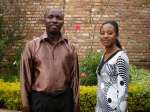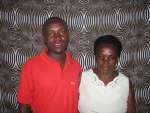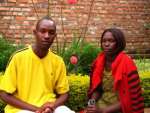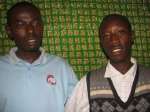Uwamwezi Philomene & Dusabe Nicole
Uwamwezi Philomene talks to Nicole about the difficulties parents face when talking to their children, and how people today can manage busy schedules to remember the past. Dusabe Nicole also wonders about how they can regain trust and love in society when certain people are known to have been murderers, and Uwamwezi Philomene counsels her in love.
Zimulinda Pheneas & Shingiro Remy
Full of questions concerning the history of religion in Rwanda and how Rwandan culture of the past differs from that of today, Shingiro Remy listens intently to the words of Zimulinda Pheneas, his counselor. Zimulinda Pheneas discusses the origins of churches in Rwanda, the issues of teen pregnancy and drug abuse, how children were traumatized even without going through the genocide, the effect of good parenting and community parenting, and his philosophy on education. He goes into detail on such subjects as rape, gendered violence, and prostitution.
Wherny Namara & Uwizeyimana Consolatrice
Through conversation, Consolatrice is able to find peace and strengthen her relationship with members of the community. Wherny helps her understand that hatred will not be helpful for the future of Rwanda.
"I developed a sense of love, the love of my enemies. I felt like I'm obliged, I felt like I have to pray for even those who hate me according to the story we shared." Uwizeyimana Consolatrice
Uwamariya Victoire & Kabuto Noah
Kabuto Noah is curious about the trauma he witnesses in children who are not old enough to remember or have experienced the genocide, but have been affected by it nonetheless. Uwamariya Victoire tells him about the ways the genocide changed how lives are experienced, complicating everything from family structure to education. Most importantly, Kabuto Noah and Uwamariya Victoire discuss the ways that fear, anger, and sadness are best handled.
Mukankubana Rose & Kwizera Jean Pierre
Mukankubana Rose tells her son about finding strength as an orphan, as a widow, and as a mother, and the secret to raising children in difficult times. Kwizera Jean Pierre is curious about the influence of their older family members, the hardest decision she had to make between education and the love she had for her family, and a book written by his uncle.
Umazikungu Beatrice & Gashumba Yves Fabrice
Although Gashumba Yves Fabrice and longs for a peaceful future, he still has a hard time forgiving those involved in the genocide and fears the resurgence of conflict. His friend Umazikungu Beatrice reminds him that kindness toward everyone is the best way to prove that Rwanda can move forward, and it is better to be remembered for acts of kindness rather than the brief satisfaction of taking revenge and being remembered for evil.
Uwayezu Dieu Domme & Gota Issa
Gota Issa asks his father, Uwayezu Dieu Domme, to explain the difference between how Rwandese lived in the past and how they live today. Uwayezu Dieu Domme takes this opportunity to describe how life was in Rwanda before ethnicities were brought by the white people. This was a time when Rwandese respected and helped each other, regardless of their background. Uwayezu Dieu Domme hopes that the Rwandese today can learn from the culture of their ancestors and start to respect each other once again. He notes that “the most important battle is to know history.”
Mukansanze Imfura Chantal & Turatsinze Jimmy
Mukansanze Imfura Chantal explains to Turatsinze Jimmy how he became an orphan and how he got to where he is today. She urges him to continue his education and, equally importantly, to treat everyone as equals, regardless of ethnicity, wealth, or status, not only for himself, but for the future of the country. Turatsinze Jimmy describes his hazy memories as a young boy about the origins of genocide—why did a plane crash start a war? Was there already a plan in place to start the killing? Has there always been a rift between ethnicities?
Pastor Ruhagararabahurga Eric & Munganyinka Daima Lydia
Pastor Ruhagararabahurg Eric describes to Munganyinka Daima Lydia how he made a fulfilling life for himself. After joining the army and fighting to protect the President, Pastor Eric realized that his true passion lies with protecting and helping others. He then became a man of God and devoted his life to helping street children find a better life in Rwanda. He describes to Daima Lydia how this journey toward faith allowed him to realize the significance of faith in reconciliation for Rwanda; forgiveness must be coupled with repentance in order to begin the healing.
Muhizi Jean Claude & Masengesho Jean de Dieu
Muhizi Jean Claude wants to inspire his friend Masengesho Jean de Dieu to be hopeful about the future by reflecting on how much has changed since his youth. Muhizi Jean Claude talks about how the segregation that existed in schools and how political instability contributed to the genocide. In answer to Masengesho Jean de Dieu’s question about ways for people to heal their emotional pain, Muhizi Jean Claude emphasizes youth breaking the cycle of ethnic discrimination.











